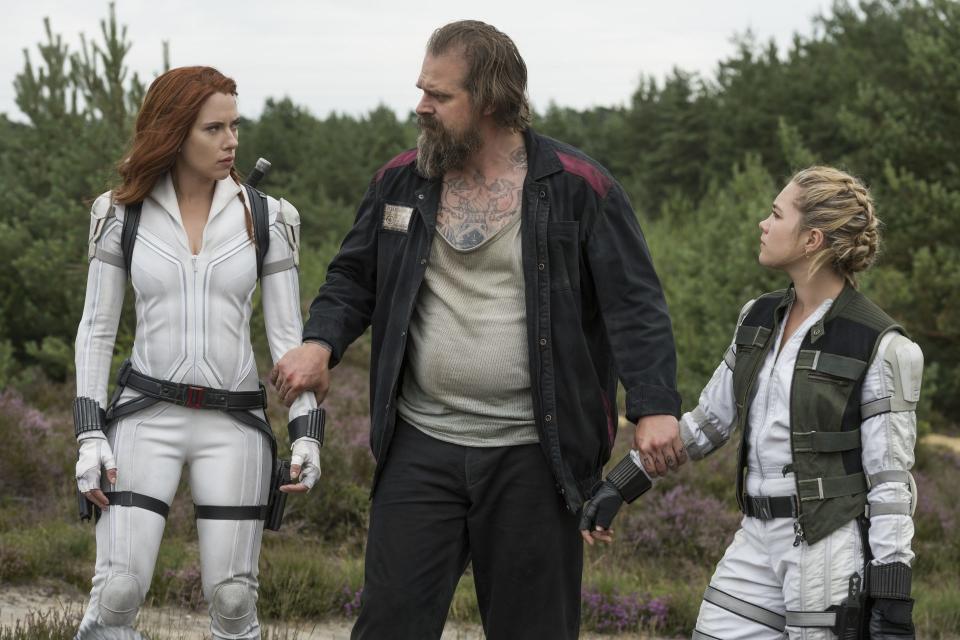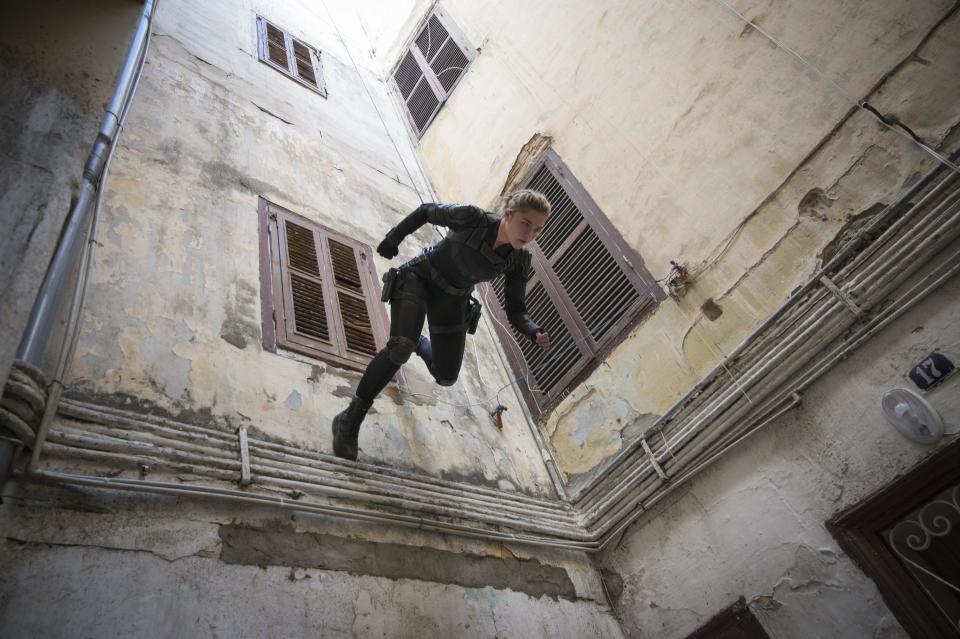BLACK WIDOW Is One of the MCU’s Best Standalone Movies
The Marvel Cinematic Universe uses a certain formula when it comes to its standalone superhero flicks. Typically, we see the before times: before Nick Fury recruited them, before they were world (or universe) renowned heroes, before they found power and purpose in the Avengers Initiative. But Natasha Romanoff never fit the Marvel superhero mold. Not because she wasn’t worthy, but because of her nontraditional entry into the universe. Black Widow was something of an enigma, her backstory played out in whispers.
So it makes sense that her standalone film is nontraditional, too. Not in format, necessarily, but in placement. Black Widow—which finally sees its release next week after months of COVID-19 shuffling—is the first film in Phase 4 of the MCU, but is set after Captain America: Civil War. Natasha is dead in the present timeline, but so alive here. In fact, Black Widow is one of the more palpably heartfelt stories in the saga thus far. It’s just a pity it comes post-mortem.

Marvel
The film opens in Natasha’s childhood. She’s deep undercover in Ohio with other Russian operatives pretending to be a happy all-American happy. There’s patriarch Alexei Shostakov (David Harbour), mother Melina Vostokoff (Rachel Weisz), and little Yelena Belova (Violet McGraw as the kid version, Florence Pugh when she grows up). They flee the Midwest when their cover is blown, but not before we see a slice of their idyllic family life. A time when scraped knees were as bad as it got and fireflies lit up a summer-green lawn. It’s a sharp contrast to what comes next. They’re torn from the only family they’ve ever known, split apart, and forced to train in the Red Room. There, they lose all bodily autonomy and become Black Widows—elite assassins controlled by a cruel master named Dreykov (Ray Winstone).
Cut to the post-Civil War timeline. Natasha is now an Avenger and on the run. She hides out in Norway, where she lives in a trailer, watches James Bond on her laptop, and eats food out of cans. It’s about as normal as it gets for a galactic superhero, and seeing this juxtaposition from the splashier saga films is a nice antidote. Natasha’s humanity comes through in little touches: the way she quotes the Bond film on her screen and blasts music in her car. The blue hair dye she wore as a kid. Later, after a fight, she takes ibuprofen for her wounds.

Marvel
It sounds silly, but all of these details come together and make Natasha a fully formed character for perhaps the first time in the MCU. She isn’t shot full of super serum or born into royalty or a daughter of gods. She’s a survivor who dreams about where she comes from. Whose abuse and trauma doesn’t define her, but gives her the most important thing an assassin can have: a heart.
It’s not long into her hideout that Natasha falls back into action, albeit on a less universal scale. This time, it’s personal. She encounters a grown Yelena in Budapest, who informs her that the Red Room is still in operation, although its whereabouts are unknown. Plagued by the guilt she associates with Budapest, Natasha decides to put an end to the Black Widow program for good. But to do so, she needs to round up the only family she’s ever known. She and Yelena set to tracking down their “parents.” Alexei, a serum-enhanced super-soldier once known as the Red Guardian (a.k.a. the Soviet’s version of Captain America), is now in prison. Melina, their mother figure, still works for the Red Room as a lead scientist.

Marvel
When they finally do reunite, it’s both awkward and tender. Alexei shrugs off the abuse “his girls” endured. Melina struggles against her role in the system and her inner desires. And Natasha and Yelena attempt to come to terms with what family means to them. Was their childhood in Ohio just a sham, or was it truly the only time they were happy? They’re split in their feelings, and that dichotomy plays out in their actions. It also leads to an adorable sisterly camaraderie; Yelena especially loves taking the piss out of her famous sibling.
From there, the action ramps up, and occasionally bloats into incoherence. This is still a Marvel superhero film, after all; there’s bound to be explosions and endless grey action. The film also has the same dull color grading as the other MCU entries, which keeps things more muted than they need to be. But there’s enough heart and goodwill to shine through the dull. As we learn more about the Red Room and those associated with it, we learn more about Natasha and what drives her.

Marvel
It helps that the performances are all top-notch. Johansson seems more relaxed in the character here, which makes sense after a decade in her shoes. This Natasha is still steadfast and precise, but there’s more vulnerability than we’ve seen before. Harbour has a lot of fun with Alexei and Weisz is as allusive as the character beats require. She feels the most under-utilized but I suppose that’s mostly by design. The real star of the show, however, is Florence Pugh. This comes as no surprise for Pugh fans, who watched her steal scenes from Meryl Streep in Little Women and scream her way to meme queendom in Midsommar. Here, she’s loose and funny, but also the film’s emotional center. The MCU should feel very lucky that they have her talent in their clutches.
Black Widow may not feel all that consequential in the grand scheme of things. Natasha is dead, after all. But director Cate Shortland and storytellers Jac Schaeffer, Ned Benson, and Eric Pearson did a lot to make this one special. Its “girl power” spirit never feels manufactured and its message for survivors is a powerful through-line. Black Widow proves that the MCU can scale down when it needs to, which is a card trick more valuable than one might think. Natasha may be dead, but Black Widow shows how powerfully her legacy lives on.
4/5
The post BLACK WIDOW Is One of the MCU’s Best Standalone Movies appeared first on Nerdist.